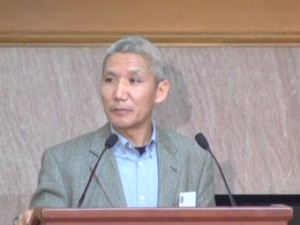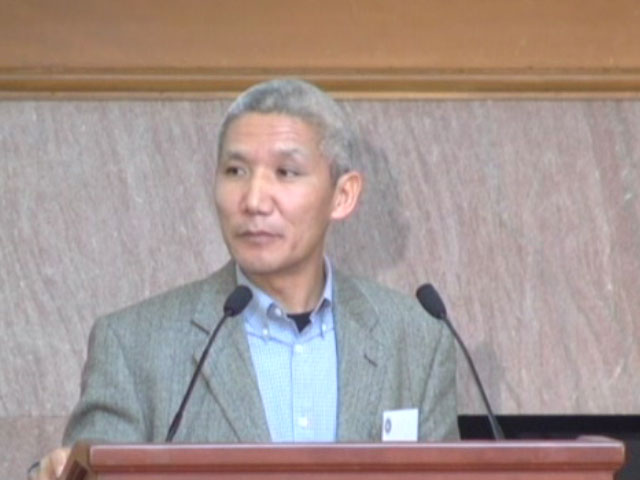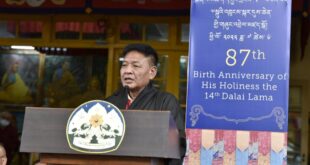Beijing has only a narrow window of opportunity to convince Tibetans they have a stake in China.
By Thupten Jinpa
The Wall Street Journal | Opinion Asia
March 8, 2012
This year’s anniversary of the Mar. 10, 1959 uprising in Tibet and the escape into exile of the Dalai Lama takes place at a time of deepening crisis. Since February 2009, at least 27 Tibetans, including many monks, have set fire to themselves in what is an unprecedented development in Tibetan society. The Chinese leadership has failed to appreciate the extent to which the nature of the Tibetan struggle has changed. As a result,Chinarisks losingTibet.
When I first saw footage of a monk standing ablaze like a column of fire, I experienced a mixture of emotions. On the one hand I could not help but admire the monk’s courage and, as a former monk myself, also feel an instinctive sense of identification and solidarity.

Though the first case occurred in Tibet in 2009, self-immolation became widespread only after the death of 21-year-old monk Phuntsog in Ngaba’s Kirti monastery in March last year. This year alone there have been 14 known cases. They have mainly been carried out by younger monks or former monks in their late teens or early twenties, although a reincarnate lama in his forties set fire to himself on Jan. 8, and there has also been a self-immolation by a monastic official.
This form of protest and sacrifice, emerging from the anguish of oppression, is dramatic, powerful and destabilizing, but it does not involve the death of others. There are still no Tibetan suicide bombers, thanks to the Dalai Lama’s emphasis on non-violence and the compassionate precepts of Tibetan culture.
So far, Beijing’s response has been simple: censor the news, label the protesters terrorists, blame it on outside forces and use excessive security force. This is almost exactly the same script we saw used by the ill-fated Gadhafi regime and currently in use inSyriaby Bashar al-Assad.
The Communist Party leadership is failing to explore the causes of this new radicalization in a deeply religious society. Tibetans have lived, or barely lived, through a harsh crackdown in the wake of protests that swept across the plateau in 2008, racial animosity against ethnic Tibetans in the aftermath and the systematic demonization of their beloved Dalai Lama. In monasteries, monks have been subject to relentless “patriotic education” sessions and driven to despair by the presence of armed troops even within their religious institutions. All of these factors have led to further unrest.
Meanwhile, there is a growing recognition among Tibetans that Beijing lacks the political imagination and will to resolve the question of Tibet. There has been a total failure to engage constructively with the Dalai Lama despite the latter’s concessions and numerous overtures over more than three decades.
This especially became evident when the Party failed to respond to the Dalai Lama stepping down as Tibetans’ political leader. Beijing hasn’t appreciated that the current struggle has gone on even after the Dalai Lama stepped down as Tibetans’ political leader. This means Tibetans now envision their struggle beyond the life of the Dalai Lama, and not necessarily in keeping with this style.
Beijing’s failures have possibly opened the way for a much more vocal and aggressive tone in Tibetans’ campaign for their legitimate aspirations. There may be a link between the current more radical protests and this change in political leadership. When the Tibetan freedom struggle was led by the Dalai Lama, there were certain norms which even the most vocal Tibetan critics of China implicitly respected, including trying to avoid publicly embarrassing Beijing. This can no longer be taken for granted.
Unwittingly then, the Party has been more successful than the exile Tibetan political establishment ever was in creating a strong united sense of national Tibetan identity across the entire plateau. If the current impasse continues, Tibetans may become bolder and demand full independence. We can also expect to see the current wave of self-immolation spreading to other parts of Tibet. No regime can have an effective weapon against individuals who are not afraid to die.
Beijing needs to find ways of convincing the Tibetan people that it does care for the survival of their unique language, culture and Buddhist faith within the larger family of the People’s Republic of China. The massive buildup of troops and climate of terror in place now is only alienating Tibetans and risking further loss of life. Appointing one more hardline party official to crack down on protests is not the answer. Taking the extended hand of the Dalai Lama to help seek a mutually agreeable long-term solution to the Tibetan problem is clearly the first and most urgent step forward.
There is no doubt in my mind that 2011 was a watershed year in the Tibetan people’s struggle, and that with the ongoing campaign of self-immolation this struggle has crossed an important threshold. If China’s leadership fails to seize the narrow window of opportunity it still has left, it will lose Tibet forever.
Mr. Jinpa is adjunct professor at McGill University and the principal English translator to His Holiness the Dalai Lama.


